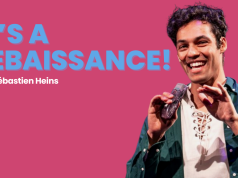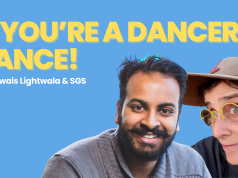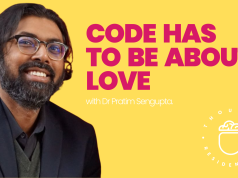Just when you thought nothing else could happen your creative team and you decide to radically alter the production and your cat keeps you up til 5am with sudden health failure. I started this month thinking about risk, and I return to it now. My creative team and I, less than a week before opening, are shifting to a new gesture. Radically strange, totally unknown. All I know is it feels imperative. The production is asserting itself to us. We listen or we don’t. We are choosing to listen. We are going on the ride. We are going into the dark. My cat is at home and hanging on. I might not sleep again til January, my body feels numb, my heart feels open and I am shockingly alive. The key is risk.
This week feels like the calm before the storm. Quiet but intense. I’m having a hard time getting things done. I’m pacing, disorganized, unable to focus, feel on high alert, bitten all my nails. It took me about 3 hours to get dressed today. I have the strong desire to flee. Brendan Healy recently talked to me about a Vincent Miller book, “A Crisis of Presence” I haven’t read it yet, the title is enough for me right now. Fight of flight. I do both. When it feels really hard to be present, when my fear is very very very high, I know the fight is with myself – to stay. Stay in this moment, don’t disassociate, don’t flee, don’t look away. We open next week.
Unpopular tension. I will fight for labour reform in the arts making sector. It’s an important fight that will benefit a lot of people. But I’m not sure it will change the culture of labour we live in. And I’m pretty sure it won’t change me. I started out with certain privileges, and then continued to make some pretty hard life choices and large sacrifices– that support my ability to funnel additional time, energy, and probably a lot of my sanity, into my work practice. Given the culture we live in, and the sheer nature of time on deck, I receive more benefits and opportunities because of this. So, labour reform will benefit many, but I’m not sure it will level the playing field. Is that what people think it will do?
Content Warning: Pessimism. Whereas yesterday I was trying to task myself with the meditation “What if where I am is what I need?” today I feel like if one more person brings up the idea of structuring a work/life balance I’m gonna punch them in the face because ultimately our arts sector, and the whole–really all the sectors–exist within neo-liberalism which has already completely destroyed and eroded the idea that the human being could be for anything other than just the extraction of pure labour.
Challenging myself to remember Deborah Hay, I challenge everyone to remember Deborah Hay, this morning, and always, with the question (ask yourself, as she would ask you – perhaps) “What if where I am, is what I need?” What if where I am, is what I need? What if where I am, is what I need.
I’m currently pan frying eggs because to be an independent artist means multi-tasking every minute of the day, or at least it does for me, and I’m thinking of the old proverb …when the student is ready the teacher arrives. When I think about the massive, total upheaval just about every aspect of my life is going through right now: personal risk, artistic risk, family upheaval, sense of self, emotional stability – all that pretty up in the air I think about how right now my two greatest teachers are fear and faith.
When was the last time you saw a dangerous piece of art? ted witzel, a long-time collaborator of mine, was asked this yesterday and then he asked me. It’s pretty rare in my experience. I want processes of making art to be safe but I don’t want art to be “safe”. A lot of people have called my work triggering. I write about power and its abuses, so this comes with the territory. I write towards reclamation. Part of healing is confronting the wound. I try to make artistic containers where we can be braver together. Safe art doesn’t ask me to confront anything – it doesn’t invite me to remember how brave I can be. And bravery, like hope, is something – I think – we have to practice.
Capacity. What is it, where do you find it, and how much do you have? What do you do when you need more? What do you do when you blow out the gas tank? What’s the connection between capacity and forgiveness? Capacity and sustainability? Capacity and self awareness? Capacity and threshold? Capacity and adrenaline? I’ve lived most of my life (and all of my career) over capacity. I know my reasons, I’m curious about yours. What’s the cost? The reward? Is it “worth” it? What are you looking for? How will you know when you’ve “found” it?
I’m thinking about how one way or another pain must find a way to express. I just spent 7 and a half hours in a psychiatric emergency ward with someone I love very much who is currently experiencing psychosis. His pain …forced its way to the surface. He needed to go somewhere where he could scream and rant in order to birth this pain, and I realize that’s why I make theatre.
I’m thinking about feeling feelings. I became displaced this summer — I lost my home & most of my possessions over a 3 month period of …well…hell. I haven’t had time to feel the feelings that come with this – grief and rage – the way I normally would…by writing. Looking back, I think I became a writer because I didn’t know how to feel my feelings and writing created a space where I could experience them in the imagined bodies of others. But then again I come from WASPS – we feel safer experiencing our feelings as long as someone else is feeling them for us.
I’m currently rehearsing a text I began 8 years ago after marathon watching dog training shows. What struck me was that the people needed more training that the dogs. Anxious people, anxious dogs. Inactive people, hyper-active dogs. I watched the owner’s discomfort when told they’d need to assert themselves and create a social hierarchy so the dogs know who is in charge. Dogs don’t want democracy – it makes them panic, get depressed, or become violent. Whereas people seem to feel this way with or without democracy.
Like many people, most of my life I wanted to believe I was taking risks without having to experience any of the pretty horrifying emotions that come with actual risk. I was a full blown perfectionist til I was 29 and perfectionism doesn’t allow for risk because it doesn’t allow for failure. Like mass culture, I was all about the rhetoric of risk, but not the practice. Lately there’s a lot of counter rhetoric around permitting failure – and I wonder how much, like risk, we talk about this while furiously making sure it never happens to us.
There was a textile work on the ceiling of the drama room at my highschool that showed a group of people encircling the words “THE KEY IS RISK”. I remember staring at that wanting to be really good at taking risks – especially if they were KEY — but not really knowing what that meant or if I was. Right now I’m currently taking the biggest artistic and personal risks of my life – and what I’m thinking about is not that motto but the circle of people surrounding it. The more I risk the more I need people around me willing to risk holding space for risk.









